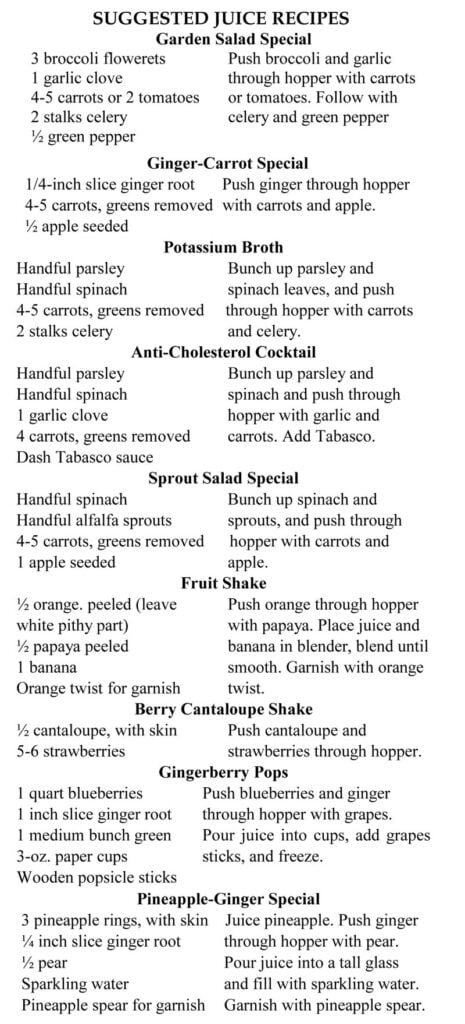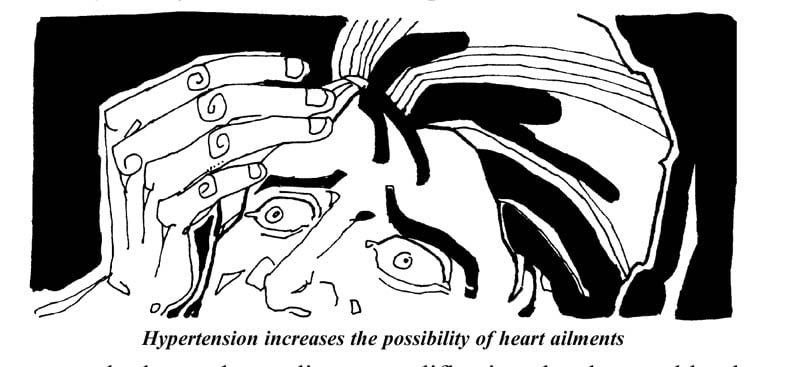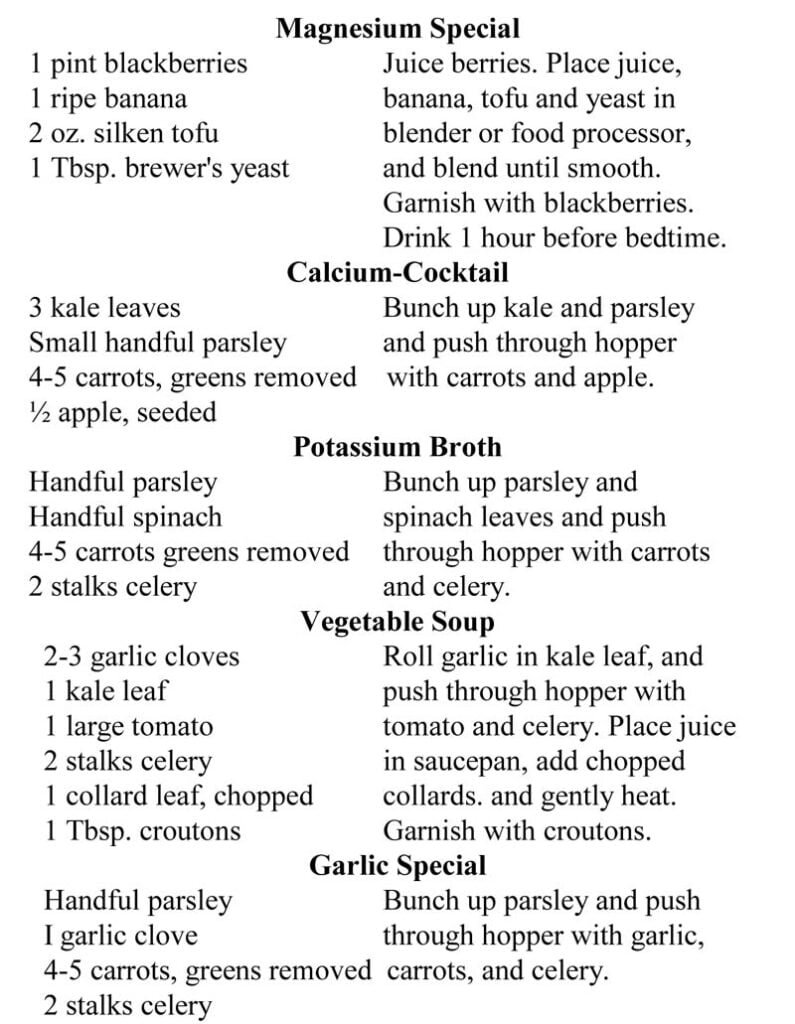The diseases mentioned under this head are more harmful to human life. High Cholesterol and Hypertension leads to many kind of heart ailments. Juice therapy suggest you how to keep them under control.
High Cholesterol
The largest percentage of total body cholesterol is manufactured by the liver and is a normal part of bile. It plays an important part in your body’s metabolism, serving as a precursor of various hormones, such as sex hormones and building cell membranes.

Elevated blood cholesterol is the primary contributor to heart disease. Cholesterol makes up a large part of those fatty deposits that accumulate in the arteries, clogging them and causing cerebrovascular and cardiac insufficiency. And do you know that cholesterol also makes up the principal portion of most gallstones? It is implicated, as well, in impotence, mental impairment and high blood pressure. High blood cholesterol has also been correlated with colon polyps and cancer.
General Recommendations
One of the goals in lowering blood cholesterol is to raise HDL (high-density lipoprotein) levels. They’re the good lipoproteins that cause ‘reverse transport’ of cholesterol from cells back to the liver. The other goal is to increase the consumption of essential fatty acids. Several studies have shown that essential fatty acids lower serum cholesterol. When a deficiency of these fatty acids deists the body tends to produce more cholesterol in an attempt to produce substances known as prosta glandins, because biosynthesis of prostaglandins is enhanced by cholesterol as well as by essential fatty acids and other components. Prostaglandins are so important that the body will keep producing more and more cholesterol just so it can get enough prostaglandins for its needs. Now, you’re probably wondering why prostaglandins are so important. They are vasodilators (agents that cause relaxation of blood vessels), inhibitors of blood clots, inhibitors of cholesterol and facilitators of many other functions associated with the preyention of heart disease. The following strategies should be of value to you in lowering cholesterol and preventing and treating heart disease.
- Stop smoking. Non-smokers have higher HDL levels than smokers.
- Exercise frequently. Reports show that even moderate aerobic exercises such as brisk walking pursued, consistently (three or four times a week for a minimum of thirty minutes each time) has lowered levels of LDL and raised levels of HDL.
- Monitor your blood cholesterol frequently. Generally, your cholesterol level should be below 200.
Dietary Modifications
Increase your intake of linoleic acid : Studies were done in Norway after World War II, to find out why death from cardiovascular, disease showed a sharp decline during the war. It was found that linoleic acid consumption was much higher during war time. Researchers have also found that men need about three to five times the linoleic acid than women need. This might account for the higher incidence of male heart attacks. Linoleic acid is commonly found in vegetable oils. The most effective source is cold-pressed flaxseed oil that has been bottled under carbon dioxide in the cold and kept refrigerated to prevent rancidity. One tablespoon of flaxseed oil per day is often recommended by nutritionally oriented doctors.
Increase your consumption of whole grains : Whole grains are good sources of linoleic acid. The postwar study in Norway found that more whole wheat and whole rice were eaten during the period when cardiovascular disease sharply declined. Other whole grains. like brown rice, are also beneficial. In additional rolled oats and oat bran are rich in soluble fibres and have a very favourable effect on cholesterol, while asylum husks (2 tablespoons daily, mixed in water) have reduced cholesterol by 10 to 14 percent.
Reduce your cholesterol intake : No more than 300 milligrams per day is the current recommendation. One large egg yolk contains 274 milligrams; three ounces of shrimp-128 milligrams; one ounce of cheddar-30 milligrams and one tablespoon of butter-12 milligrams.
Significantly lower your intake of foods high in saturated fat : It is as important as reducing your intake of cholesterol-rich foods. Saturated fat should represent only about 10 percent of your daily diet. Avoid fried foods, and keep in mind that many fast-food restaurants use beef fat for cooking their French fries, chicken, fish, and hamburgers. Beef fat contains high amounts of both saturated fat and cholesterol, and frying temperatures above 4000F produce toxic substances.
Avoid margarine and hydrogenated oils : Margarine contains a substance known as trans-fatty acid, which inhibits prostaglandin production. Instead make better butter by softening one pound of butter in your blender, adding one cup of vegetable oil, blending and refrigerating. Substitute expeller—pressed or cold-pressed vegetable oils for all your cooking needs. Standard-fare oils contain trans-fatty acids, which can raise blood cholesterol. Conversely, cold-pressed olive oil has been shown to help reduce blood cholesterol. Other cold-pressed (not heated above 1000F or expeller pressed using mechanical pressure exclusively) oils are also good choices. Look for the words ‘cold-pressed’ or ‘expeller pressed’ on the label.
Avoid non dairy coffee creamers : Most of these milk substitutes contain coconut oil, a very saturated vegetable fat, along with a large amount of sweetener. Soya milk is a much better choice, and soyabeans have been found to lower cholesterol.

Avoid refined carbohydrates : Sugar, alcohol, and refined flour are known to inhibit prostaglandin production. Sweeteners like refined sugar and fructose have also been shown to raise blood cholesterol and triglycerides. Read all labels. Many sugars are advertised falsely. For example, fructose is often the main ingredient in well-advertised sugar-free frozen yogurts. Instead of sweets try fresh fruit, frozen fruit pops, or a fresh fruit smoothie. Instead of an alcoholic drink at happy hour, try a fresh juice cocktail. And bake or buy whole grain products.
Reduce your intake of coffee : Studies show that with an increased consumption of coffee, the blood cholesterol level goes up. Black tea (not herbal) can have the same effect.
Avoid regular table salt, and use sea salt sparingly : Season your foods with herbs, spices, garlic, onions and chili peppers, including cayenne. Garlic has been shown to reduce blood cholesterol. slow the development of plaque, and inhibit blood clotting. Hot peppers also have an anticlotting effect.
Generously consume legumes : Beans (such as soyabeans, pinto beans, and navy beans), split peas, and lentils are among the foods found to lower cholesterol.
Increase your consumption of omega-3 fatty acids : These ‘good fats,’ which must be supplied by the diet, are necessary for carrying fat-soluble Vitamins like A, D, E, and K, for hormone synthesis, for skin function; and for cell wall synthesis. They also lower blood cholesterol and triglycerides and reduce the tendency of blood to clot. Fatty cold-water fish are among your best choices, and they include mackerel, herring, sardines, bluefish, salmon, tuna, Pacific oysters and European anchovies. Cold-pressed flaxseed oil (buy only brands that are kept chilled in opaque bottles) is an excellent source of omega-3 fatty acids. Nut oils, safflower oil, and sunflower oil are also good sources, as are dark green vegetables.
Try the Juice Fast : The Juice Fast is one way to lower cholesterol. For example, carrot Juice has been shown to flush fat from bile in the liver, helping to lower cholesterol.
Nutrients That Help
- B-complex Vitamins are necessary in fat metabolism and are protects for the liver. Vitamin B6 and niacin have been shown effective.
- Vitamin C deficiency is associated with elevated cholesterol levels. This Vitamin is known to lower cholesterol, especially when combined with bioflavonoids. Vitamin C is also known to increase prostaglandin production.
- Vitamin E improves circulation.
- Chromium may reduce total cholesterol and triglycerides, and raise HDL cholesterol.
- Copper deficiency is associated with elevated cholesterol levels.
- Magnesium deficiency can cause spasms of the coronary artery. Spleroentation may reduce total cholesterol, raise HDL levels and inhibit platelet aggregation (clumping).
- Potassium deficiency is associated with arrhythmia, a change in the normal pattern of the heart beat.
- Selenium may reduce platelet aggregation.
- Zinc is known to increase the production of prostaglandins.
- Co-enzyme Q10 improves circulation.
Beneficial Juices
- Carrot, apple, ginger root, orange and strawberry—all have demonstrated the ability to lower LDL levels.
- Green leafy vegetables—sources of B-complex Vitamins.
- Kale, parsley and green pepper—sources of Vitamin C
- Grape, parsley and lemon—sources of bio-flavonoids.

- Spinach, asparagus and carrot—sources of Vitamin E.
- Potato, green pepper apple and spinach—sources of chromium.
- Carrot garlic, and ginger root—sources of copper.
- Beet greens, spinach, parsley and garlic—sources of magnesium.
- Parsley, garlic, spinach and cantaloupe—sources of potassium.
- Red Swiss chard, garlic and orange—sources of selenium.
- Ginger root, turnip, parsley, garlic and carrot—sources of zinc.
- Spinach—source of coenzyme Q10.

ATHEROSCLEROSIS
Atherosclerosis is a disorder characterized by a hardening and thickening of the blood vessels caused by accumulation of fat-containing materials called plaque within or beneath the surface of the blood vessels. This condition is often associated with high blood pressure and a weak pulse. Symptoms can include angina, leg cramps, gradual mental deterioration, weakness or dizziness.
General Recommendations
While diet may be the most important contributor to atherosclerosis, other life-style factors also play an important part in the prevention or reversal of this condition. Physical exercise has a direct relationship to cholesterol levels. Engage in some aerobic exercise, such as walking, at least three times a week. Smoking greatly increases your risk and should be stopped. Stress management is also a must.
Dietary Modifications
- Follow the Basic Diet, which is low in fat and high in fiber.
- Reduce dietary cholesterol.
- Reduce fats, especially animal fats and hydrogenated vegetable oils (e.g., margarine, which is often promoted as beneficial). Try making better butter by combining a pound of butter with one cup expeller-pressed vegetable oil, like safflower or sunflower oil.
- Increase your consumption of vegetable proteins such as beans, lentils. and split peas. Soyabeans are especially beneficial, as they are rich in lecithin, a nutrient that enhances the solubility of cholesterol and actually aids in pulling cholesterol from tissue deposits.
- Avoid coffee and alcohol. Epidemiological studies have correlated coffee consumption with atherosclerosis and hyperlipidemia. Alcohol has been shown to have a harmful effect on blood pressure body weight and glucose tolerance.

- Increase your consumption of omega-fatty acids by eating more cold-waterfish and fish oils and adding flax-seed oil to your diet. Pure cold-pressed flaxseed on is the highest in omega-3 fatty acids and is excellent for the prevention and care of atherosclerosis. Try to have one-half tablespoon each day.
- Eat garlic, ginger, and onions, all if which have been shown to reduce the likelihood of blood-clot formation.
- Add alfalfa sprouts and their juice to your diet. Alfalfa has been shown to decrease cholesterol levels and help shrink the fatty plaque that can block blood vessels.
Nutrients That Help
- Vitamin B6 deficiency is associated with a higher risk of atherosclerosis. This nutrient may inhibit blood clots from forming, and can play an important role in preventing this condition.
- Vitamin C may be deficient in sufferers of atherosclerosis. Supplementation may lower total cholesterol, triglycerides and total fats while elevating the level of high-density lipoproteins (HDL-s), which sweep the body clean of excess cholesterol.
- Vitamin E may help prevent platelets from clumping together and forming blood clots, may lower cholesterol, and may decrease pain in limbs caused by inadequate blood supply.
- Niacin, although long used to lower cholesterol, is no longer recommended as a supplement except under strict medical supervision. In supplemental form it is often toxic causing liver damage and glucose intolerance. There is no worry of high-dose toxicity, however, when you ingest foods that are rich in niacin. Niacin is highest in brewer’s yeast, rice bran, wheat bran, turkey, chicken, and trout.
- Bromelain is recommended to Inhibit blood-clot formation, relieve angina, and break down fatty plaques.
- Calcium lowers cholesterol and triglycerides and prevents blood clots.
- Copper deficiency can elevate cholesterol. Typical American diets are low in copper.
- Chromium has been shown to lower cholesterol and triglycerides.
- Magnesium deficiency has been associated with an increased risk of heart disease. Supplementation may reduce total cholesterol, raise HDL cholesterol, and prevent the formation of blood clots.
- Potassium may inhibit the formation of fatty plaque deposits.
- Selenium deficiency is correlated with atherosclerosis. Supplementation may prevent blood clots from forming.
- Lecithin enhances the solubility of cholesterol. Soybeans are high in lecithin.
Beneficial Juices
- Kale, spinach, turnip greens, and sweet pepper—sources of Vitamin B6.
- Kale, parsley, green pepper and broccoli—sources of Vitamin C.
- Spinach, asparagus and carrot—sources of Vitamin E.
- Pineapple—the only source of the enzyme bromelain.
- Kale, collard greens, turnip greens, and parsley—sources of calcium.
- Carrot, garlic, and ginger root—sources of copper.
- Potato, green pepper, apple, and spinach—sources of chromium.
- Beet spinach, parsley, and garlic—sources of magnesium.
- Parsley, Swiss chard, spinach, and garlic—sources of potassium.
- Red Swiss chard, turnip, garlic, and orange—sources of selenium.
Hypertension
Hypertension, also called high blood pressure, is defined as a repeatable blood pressure reading of greater than 150/90. In more than 90 percent of the people with hypertension, the disorder has no identifiable cause, although its risk is increased by excess weight, a high sodium level in the diet, a high cholesterol level, and a family history of high blood pressure. For some people, dietary changes can lower blood pressure. However, recent research shows that a dietary modification that lowers blood pressure in one individual may not have the same effect in another individual.

Some detective work may be necessary, but the pay off could be your life. Hypertension is associated with an increased risk of heart disease and death. In past years it was common to prescribe drugs to lower blood pressure, but questions about the safety of this treatment are making diet and life-style changes much more attractive for some patients.
General Recommendations
Incorporate a regular form of exercise into your schedule. Walking is a good way to start. Eliminate smoking and eliminate or greatly reduce alcohol and caffeine consumption. Stress reduction techniques such as biofeedback and yoga may be helpful. Weight reduction consistently lowers blood pressure in overweight individuals.
Dietary Modifications
Reduce the amount of salt in your diet. Do not add salt to your food and avoid eating processed foods, which are often high in salt. Be aware, though, the reduction of salt will not help in all cases.
Increase your consumption of onions and garlic. In addition to its cholesterol-lowering and blood-thinning abilities, garlic also lowers blood pressure. Onions are also useful for this purpose.
Nutrients That Help
Calcium, when present in high levels, is associated with low blood pressure.
Magnesium, when present in low levels, is associated with high blood pressure.
Potassium, when present in high levels, is associated with low blood pressure.
Beneficial Juices
Kale, collard greens and turnip greens—sources of calcium.
Collard greens, parsley and garlic—sources of magnesium.
Celery, Swiss chard, carrot, and cantaloupe—sources of potassium. q Onion and garlic-contain factors that lower blood pressure



